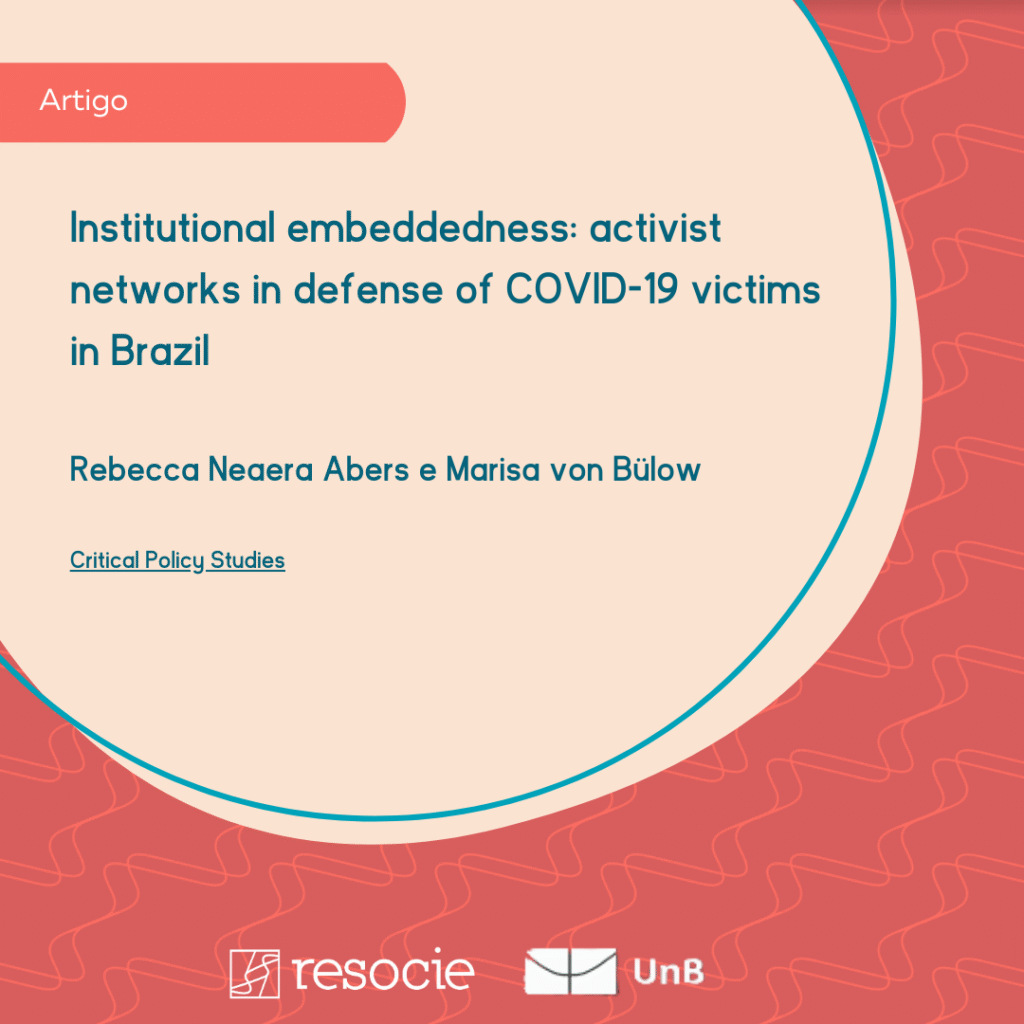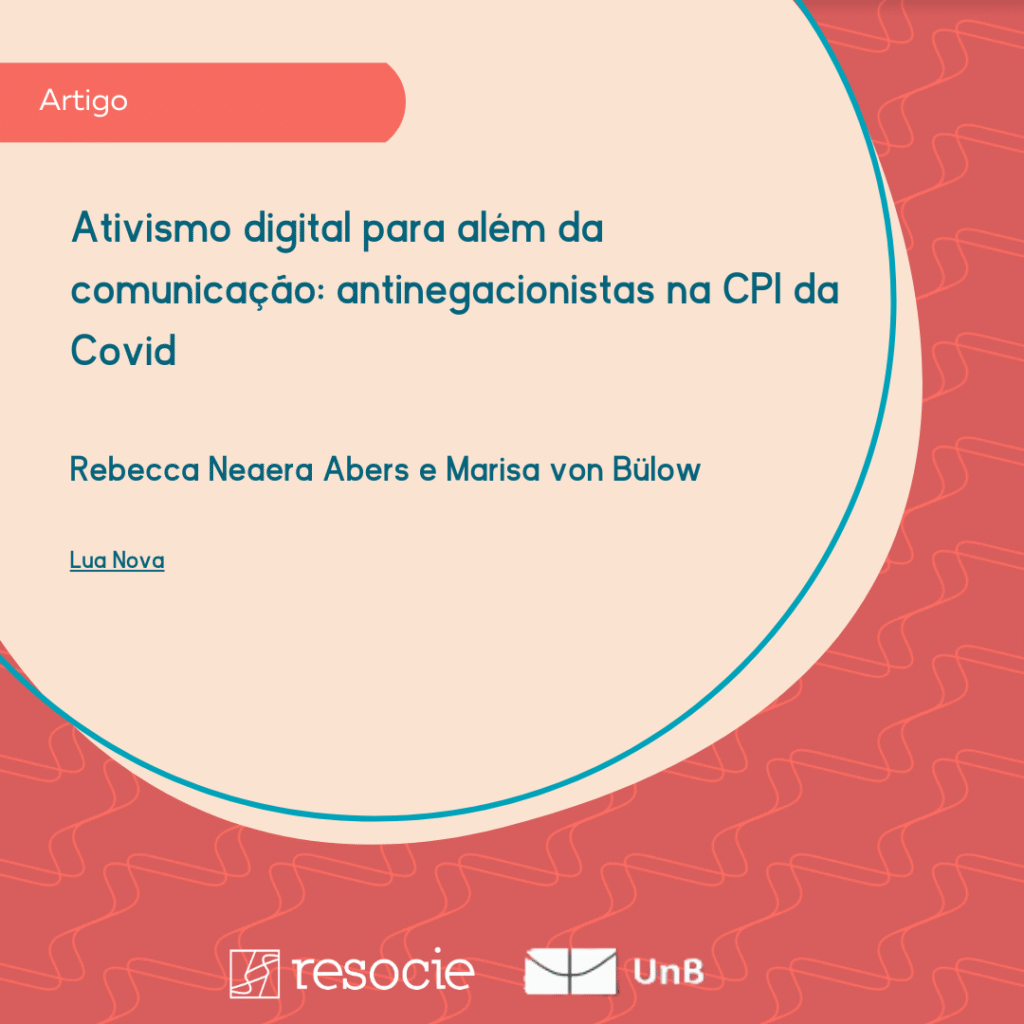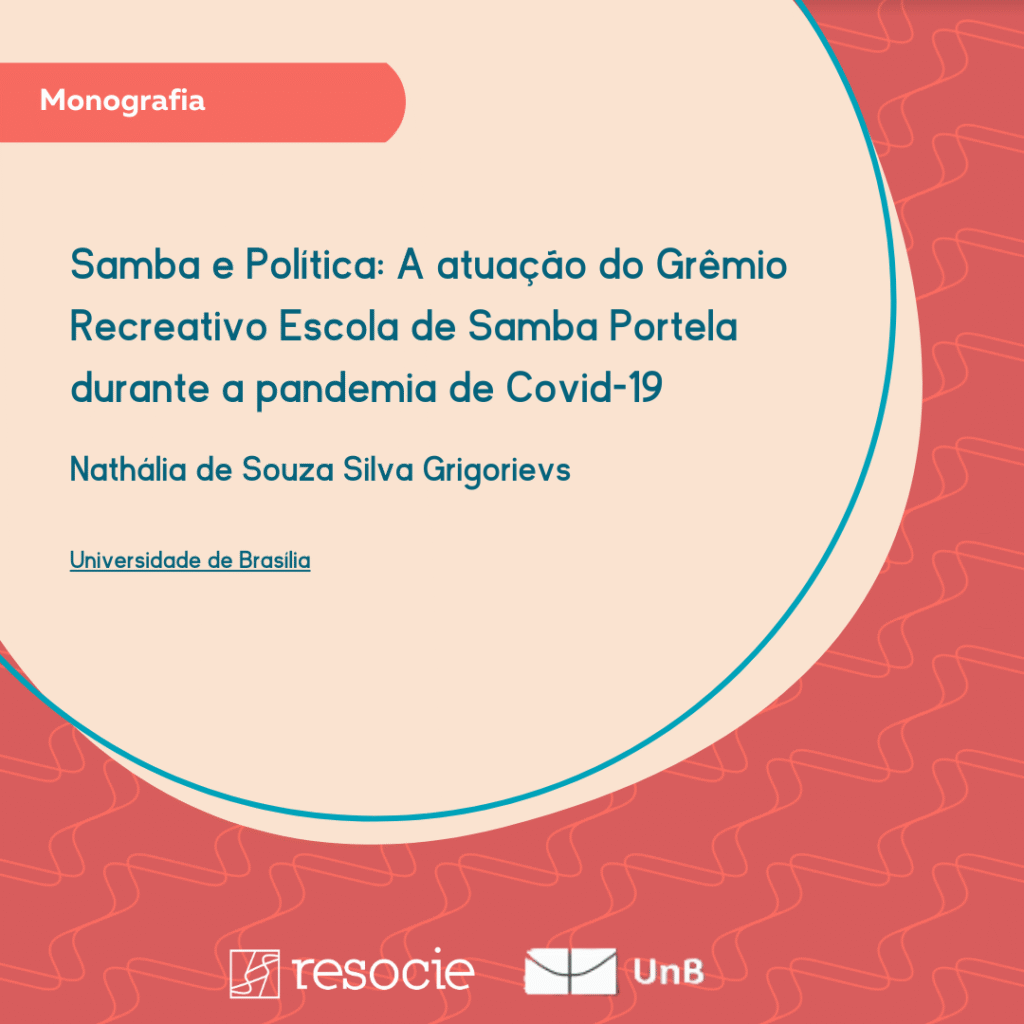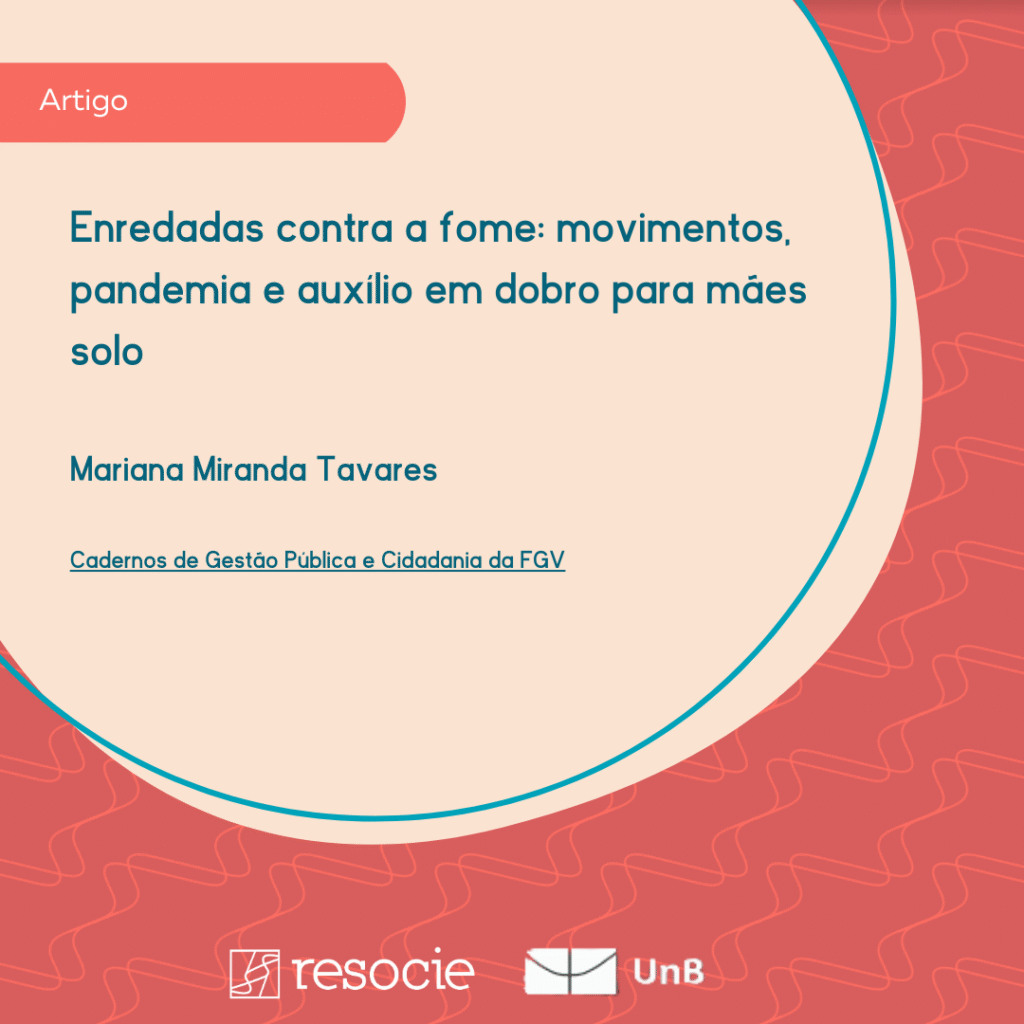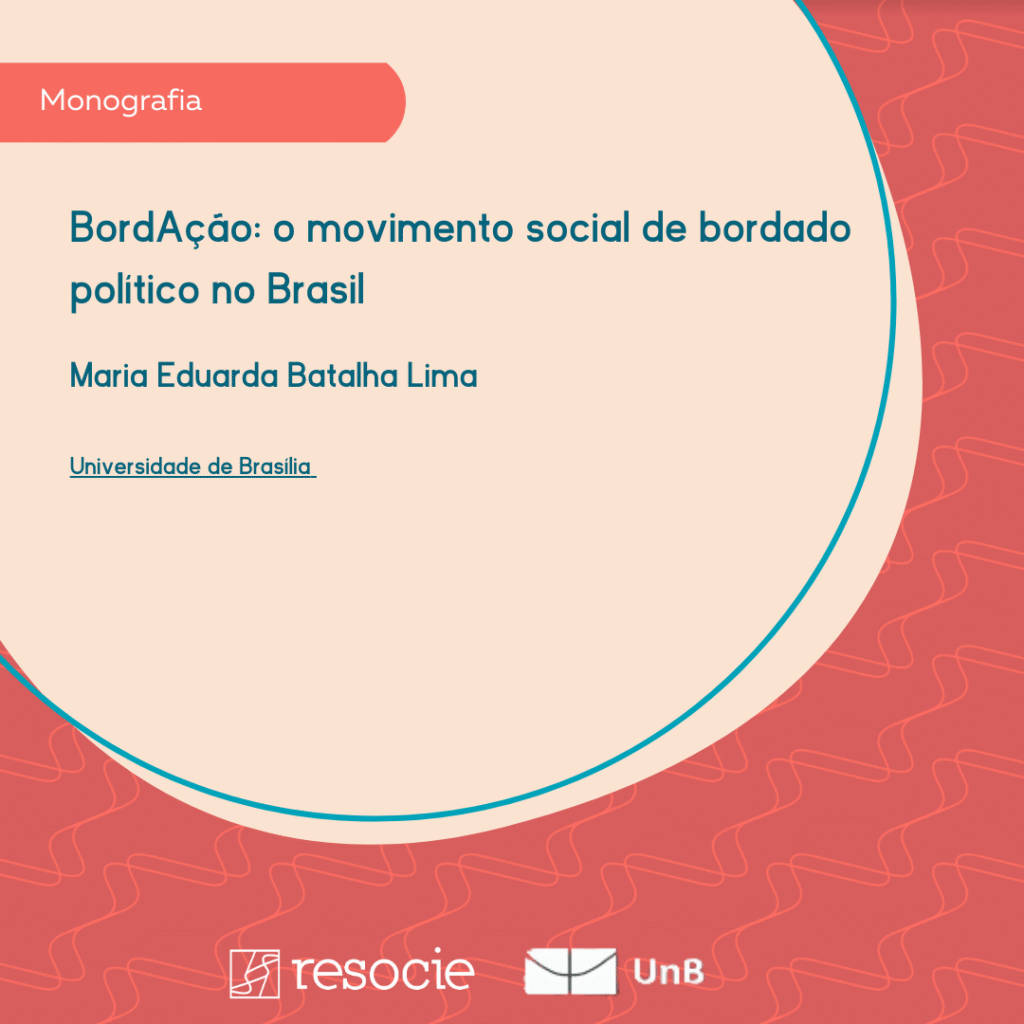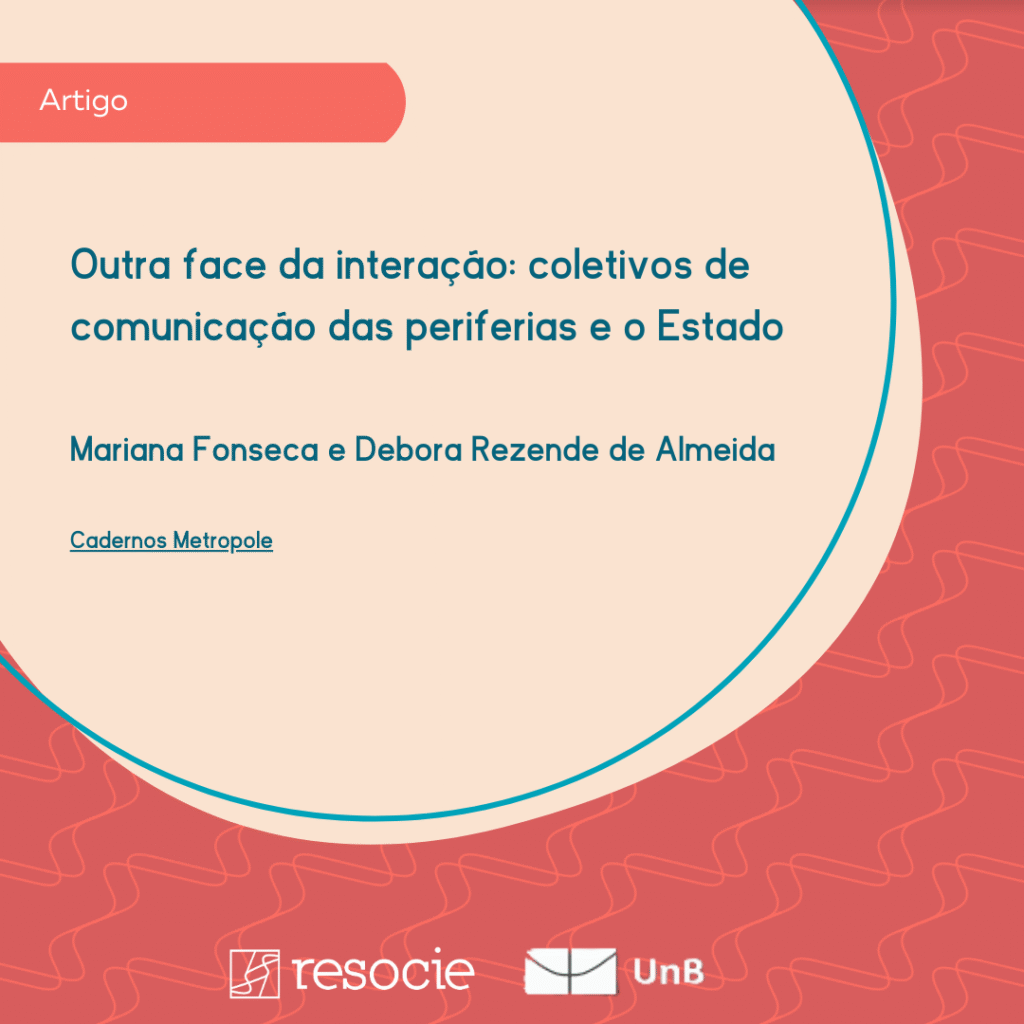Publications produced by Resocie about the Covid-19 pandemic:
Artigo das professoras Rebecca Abers e Marisa von Bülow que mostra como redes de ativistas conseguiram atuar dentro do Estado em defesa das vítimas da COVID-19, mesmo sob um governo federal de extrema direita. O artigo contribui para a compreensão das estratégias ativistas em cenários autoritários.
Artigo das professoras Rebecca Abers e Marisa von Bülow que contribui para os debates teóricos e empíricos sobre os significados do ativismo em plataformas digitais, a partir da análise da atuação de ativistas digitais antinegacionistas na Comissão Parlamentar de Inquérito do Senado Federal sobre a covid-19.
Monografia de final de curso apresentada por Nathália de Souza Silva Grigorievs, em setembro de 2024, sob orientação de Rebecca Abers. A monografia debate a relação entre samba e política durante a pandemia da Covid-19. A pesquisa analisou como a Portela utilizou seus canais digitais para engajar a comunidade e manter seu papel político e social durante a pandemia, destacando a importância de seu trabalho para a formação de cidadãos críticos e politizados.
Artigo publicado por Mariana Miranda Tavares que analisa como movimentos sociais articulados em rede atuaram para visibilizar essas mulheres e suas especificidades na proposição, discussão e aprovação do auxílio emergencial em dobro para as mães solo.
Monografia de final de curso apresentada por Maria Eduarda Batalha Lima, em dezembro de 2023, sob orientação de Rebecca Abers. A monografia propõe estudar o movimento político de bordadeiras no Brasil, que utiliza o bordado como forma de protesto e conscientização. A pesquisa mostra que os coletivos, de orientação de esquerda, buscam diálogo político e a desconstrução de estereótipos ligados ao bordado.
Artigo publicado por Mariana Fonseca e Debora Rezende de Almeida que debate formas de ação coletiva de coletivos de comunicação nas periferias urbanas na pandemia de Covid-19. O texto propõe uma interpretação baseada na história e no processo para entender esses atores e por que criticam a interação com o Estado .
Final course monograph monograph proposes to study how social movements influenced the National Congress in the proposal, discussion, and approval of double emergency aid for single-parent families headed by women.
An article published by Jaqueline Barbosa shows artistic language as a powerful tool for constructing a minimally common political project during times of crisis. The article describes some national artivism initiatives carried out from March 2020 to May 2021.

Denialism and populism: two sides of a coin in Jair Bolsonaro's Brazil
This article analyzes the impact of the COVID-19 pandemic on the Brazilian radical right, as well as its responses to the pandemic, during the period from March 2020 to October 2021. Despite low approval ratings, the Brazilian president maintained a denialist discourse throughout this period. The authors argue that to explain this denialism, it is necessary to understand the populism of the Brazilian radical right as more than just an ideology, but rather as a social movement.

COVID-19's political challenges in Latin America
In a text published in the book COVID-19's political challenges in Latin America , Rebecca Abers and Marisa von Bülow explore the creative process of creating new frameworks and routines for collective action in the face of the pandemic. They explore the pandemic response as a "problem-solving" process that involved recombining ways of understanding and acting that have been historically mobilized by social movements.

An article published in the newspaper El País by Marisa von Bülow, co-authored with Mariana Llanos, discusses how Jair Bolsonaro's strategy of polarization and radicalization in the face of the pandemic crisis could isolate him and interfere with the necessary cooperation to confront it. The authors warn that this attitude could isolate Brazil and hinder the country's recovery.

This article, published in Nexo Jornal , is co-authored by Rebecca Abers and other professors and addresses the traumatic consequences of the pandemic, grief, the right to memory, and institutional accountability in this process. The authors highlight the role of the State in guaranteeing the right to memory and mourning in the context of a traumatic experience such as the pandemic.

Rebecca Abers and Marisa von Bülow, in El Pais : “The absence of a unified front of political parties and leaders on the best course of action to address the crisis only makes state action even more difficult, despite the efforts of many local authorities. The result is an erratic and inconsistent state, unable to protect a large part of the population from the disease and the economic effects of the pandemic.” Continue reading here.

Article by Marisa von Bülow for Carnegie : “As Brazilian politicians argue over how to respond to the coronavirus pandemic, civil society organizations from the country's slums have come together to educate and advocate for their communities. But they cannot do it alone”. Read on the Carnegie Endowment for International Peace blog.
Master's thesis defended by Mariana Fonseca in June 2021. The dissertation offers an analysis of the main interpretative frameworks mobilized by communication collectives from the peripheries during the Covid-19 pandemic. Check out the full work here.

This article, produced by Rebecca Abers, Federico Rossi, and Marisa von Bülow, compares how COVID-19 has affected the relationship between the state and society differently in two relatively similar countries: Brazil and Argentina. Through a dialogue between theories of social movements and ideational institutionalism, it argues that the variation in responses to the COVID-19 pandemic is explained by the different roles played by social movements within and outside of government and by contrasting ideational disputes. Read the article available in English .

